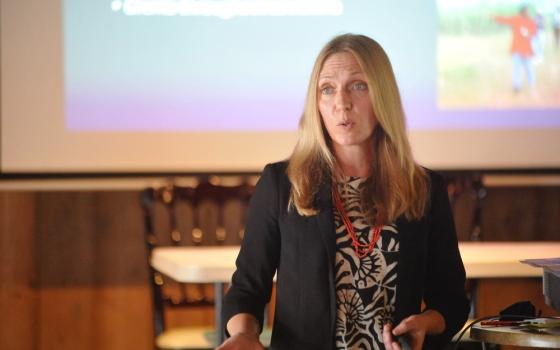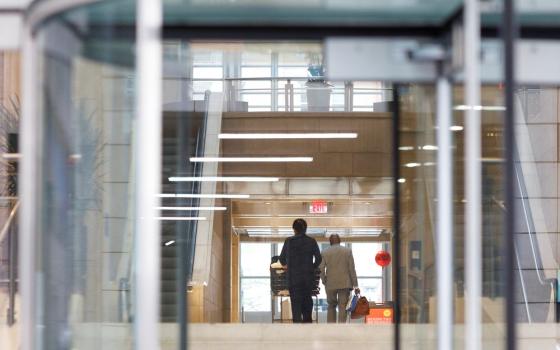If we understand liturgy as how every culture shapes and affirms its basic assumptions, values and principles, we will begin to see something so pervasive that it has become invisible to us. Fish do not know they are in water, and we human beings do not normally think about culture or our point of view or as subjective but as simply “reality.”
But, in fact, the world we know is the product of both personal and communal conjuring, reinforced by protocols, symbols, rituals, common narratives and assumptions. This is liturgy.
And if you still can’t see it, think of weekend football, the costumes, colors, behaviors and expense in both time and money that people devote to reinforcing their fan identity and loyalty.
 |
Join us at Celebration's Conference on Effective Liturgy: A Light to the Nations: Comprehensive Immigration Reform and the Church’s Global Commitment to the Poor. |
Liturgy, from the ancient Greek word leitourgia, describes public service -- “the work of the people” to sustain civic institutions and social cohesion. While often used to define public worship, the term broadly describes the process of human meaning making, the heart of every successive culture, the basis for national identity, patriotism, economic and social community.
At the heart of the current debate over immigration reform is the issue of social and racial inclusion that challenges the dominant culture’s sense of security and superiority.
The old narrative of America as a nation of immigrants or the de facto benefits of immigrant labor in our economy are superseded by new narratives of fear and threat, drugs and disease, invasion and freeloading, aliens and illegals who slip across our borders, live in the shadows and sap our vitality. No amount of data or any honest analysis about why immigrants are leaving their home countries to come here can dispel the myths and anecdotal evidence of rising crime and threatened mores.
Only another culture can teach us to see differently.
To be a Christian is to publicly profess to a specific culture of values and principles affirmed by a profound liturgical formation. Baptism is a ritual of initiation and incorporation that claims absolute loyalty, even conversion from other cultural values that compete with its demands.
To be a disciple, to be formed by the Word of God, to profess faith in God, in Jesus and in their Holy Spirit, to join with the baptized assembly around the altar of sacrifice, the table of communion, is to say that, before I am an American, or Irish, or a Rotarian or liberal democrat, I am a Christian.
Whatever the issue, the cost, the challenge or the resistance, I am a Christian first, and my identity and destiny depend on whether I stand with Christ.
Of course, even for those who are conscious of their Christian formation, the culture they obey in their daily lives is often a mix of competing values, incompatibilities and compromises that have become invisible to them.
When was the last time you felt confronted at church to act differently in your civic life, at work, in social settings, in the way you shopped and consumed, in what you approved or opposed or just went along with in the dominant culture? Does Jesus make radical claims on you or is he a friend who comforts you and conforms to your lifestyle and thinking? Is there any cost to our discipleship, if we think of it at all in our busy lives?
The U.S. Catholic bishops have developed strong views on immigration policy that are grounded in the social justice tradition of the church and clearly visible in our weekly celebration of the Eucharist.
In broad principle, the church welcomes the stranger, makes room at the table of human resources, finds Christ in serving the poor, the hungry, the homeless, the alien resident, the convict, the sick and the needy. It affirms in its liturgical processions that we are a pilgrim church, an exodus people, a community of seekers and servants, the body of Christ in the world, identified with all those who suffer injustice, violence, persecution for the sake of advancing the realm of God, both spiritually and in all forms of human development. 
Jesuit Fr. Jake Empereur has found in the liturgy a human rehearsal for our divine future, a model for the expanding global economy that respects human dignity and diversity. Our liturgical life must become our real life, an alternative to any national or economic agendas that dominate other cultures for the benefit of the few over the needs of the many. The ideologies that justify such systems are among the causes of global migration, exploitation and enormous disparity in the human family that shares the planet.
Immigration reform is on the table, and the church must be there to represent the poor. By its liturgical life it forms millions of Americans who are part of the problem and therefore must also be part of the solution.
Please join us Jan. 12-14, 2011, in San Antonio at the Celebration Conference on Effective Liturgy: “A Light to the Nations: Comprehensive Immigration Reform and the Church’s Global Commitment to the Poor.”
The issues are critical and the timing could not be better.



